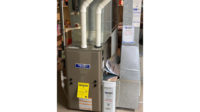When it comes to the shoulder season, there are multiple ways HVAC contractors can stay busy and still generate revenue. It’s the perfect time to study up on industry changes, train employees, do truck inventory, follow up with the ghosts of customers past, update business profiles, and prepare a business for when the shoulder season lifts.
First and Foremost
First things first: The time to think about what to do during a shoulder season shouldn’t be during the shoulder season. Contractors need to plan ahead. They can’t allow themselves to ever fully live day-by-day.
“What we try and instill within distributors is really being able to plan for the future during busy seasons … and let us be a resource to you to look ahead to shoulder seasons,” said Zachary Perge, vice president of distribution strategies at HARDI.
Dayna Hottle, general manager at C & C Heating and Air Conditioning in Roseville, Michigan, focuses on looking through old estimates for follow-up opportunities to see if there were any jobs they didn’t close during the busy season.
“Basically going through anything that potentially wasn’t scheduled and asking: Is there any opportunity to reach back out to that customer and get them on the schedule during the [shoulder season]?” Hottle said.
Katie Donovan, CEO at Camp Digital, a digital marketing company exclusive for the trades, said she’s a huge advocate for focusing on the fundamentals first during a shoulder season.
“So making sure your Local Service Ads (LSA) are up and running, that your Google Business Profile is optimized, and you’re doing the best you can … It’s a dogfight. So you have to find every lead you can … Equipment is not going to break down. Customers aren’t going to have an emergency situation. So we have to create a demand,” Donovan said.
Generating Revenue
When it comes to generating revenue during the shoulder season, HVAC contractors may have to think outside of the box.
Hottle said a lot of the way they generate revenue during the shoulder season is through the discounted opportunities they offer. C & C also relies heavily on maintenance work for their customers during the shoulder seasons.
“Reaching out and making sure their tune-ups were completed or offering discounts for potential replacements,” Hottle said.
C & C also takes advantage of the services provided to them by Service Titan, specifically in the software’s “Follow Up” tab. When the shoulder season hits, C & C uses that as resource to see which customers of theirs they should check back with.
Perge is a big believer in fixing a Profit and Loss (P&L) statement when it’s great, not when it’s broken.
“Really take a deep look at everything from your personnel expenses, your property, plant, or equipment expenses, technology expenses, insurance costs, and taking a fine lens to that and in turn … reinvest in revenue projects,” Perge said.
Donovan said finding “little honey pots,” or sweet spots, is going to be very important. Two of these are video and Microsoft ads.
According to a conversation Donovan had with Google back in March of 2022, less than 2% of people in the HVAC space are using video. And according to Statista, in 2020, U.S. adults spent 103 minutes a day watching video on devices, not including television.
“There’s also email or other ways to communicate with customers to try to drum up that some of that business. But pushing an offer is really going to be your biggest concern. Make sure you've got a solid offer that's going to try and push people over the edge,” Donovan said. “I’ve never been to a friend’s house where they were like, ‘I have the baddest-ass HVAC system.’ People just don’t think like that, until they know it’s a problem.”
So there have to be incentives for those folks who are holding out to repair or replace their HVAC system until they need it again.
“It can be discounts. But I am a bigger advocate of trying to package things in,” Donovan continued. “IAQ is still a really big talking point right now. A lot of people are hanging their hat on SEER rating changes that are coming out, but consumers don’t know about those things.”
Staying Busy
Perge has, in a good way, gotten the reputation of being an alarmist in the HVAC industry.
“I always instill in our members that whenever you have downtime. Take a few hours and war game a scenario. Talk about what you would do if you had an unreasonably warm winter,” he said. “Scenario plan what the next quarter looks like, or the next five years. Just because the phone isn’t ringing the way it was in July, doesn’t mean you can’t stay busy and put yourself in a really good position once the shoulder season lifts.”
Perge recommends contractors really do their homework on the Inflation Reduction Act (IRA).
“Those who win are going to be those people who, from the top to the bottom, can really speak on it,” Perge said.
And they need to be able to communicate the IRA with homeowners, who likely won’t know about the rebates associated with it. Shoulder season is a great time for contractors to study up.
Hottle’s goal is to keep her service techs and installers working every day during the shoulder season — ideally, working in customers’ homes. But sometimes that isn’t a possibility. So they’ll do truck inventory or focus heavily on training their technicians in order to get them ready for the next season.
“In August, we really started focusing on reaching out to customers and scheduling furnace tune-ups. We are already scheduled through November. So we moved focus from getting them scheduled to getting our service technicians in front of our customers.”
When Hottle’s installers do install air conditioners during the winter, the technicians go back in the spring to start them up and check that they’re functioning properly.
“It helps offset those calls during the busy season,” Hottle said.
If a contractor has already leaned into their installed base, that’s where those business fundamentals come back into play to keep staff busy during the shoulder season, Donovan said. One example might be updating Google Business Profiles with more categories that are much less competitive in the HVAC market, like installing ceiling fans. They aren’t as high in volume, but they also aren’t as competitive as other HVAC services.
“It all goes back to those honey pots,” Donovan said.











